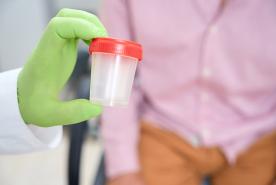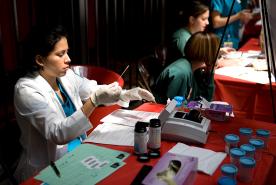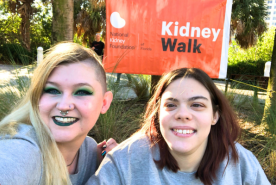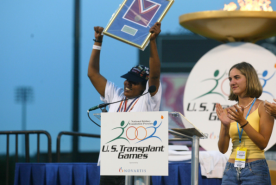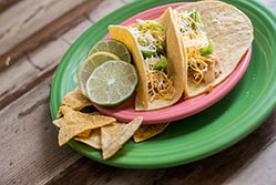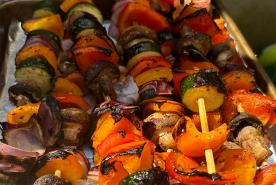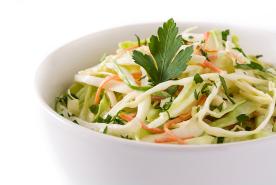Last Updated: October 11, 2024
Medically reviewed by NKF Patient Education Team
About nutrition after transplant
Your diet – what you eat – still plays a big role after a kidney transplant. Kidney transplant patients should keep a healthy weight and exercise regularly. A healthy, balanced diet will help prevent high blood pressure, high blood sugar, excess weight gain and promote overall wellness and health. The anti-rejection medications or immunosuppressants, you’ll take after your transplant will also have an effect on what you can and can’t eat.
After a kidney transplant, plan to follow a diet low in salt and high in fiber. A balanced diet includes a variety of fresh fruits and vegetables, lean meats, reduced-fat dairy products, whole grains, and plenty of water. It is important to keep your new kidney hydrated, so drink plenty of water and limit drinks with caffeine.
Along with a healthy diet, you may need to avoid eating certain types of foods. Your healthcare team can help you understand which foods you should avoid – and why. The dietitian at your transplant center can help you find a diet that is right for you.
If you have diabetes, your diet after transplant should include three balanced meals to manage blood sugar. A balanced meal includes three different food groups with moderate amounts of carbohydrates and fat. Work with your doctor and dietitian to keep your diet and blood sugar in good control. Visit the NKF Nutrition Coach for more information about general nutrition, recipes, and more.
How transplant medicines affect what you eat
The anti-rejection medicines you take after a kidney transplant change the way your body works by lowering your immune system and interacting with some foods. Some of these medicines can change how you feel, affect how your body processes foods and nutrients, or put you at higher risk for issues like gaining weight and getting sick.
Steroid medicines after transplant
The biggest change you may notice is right after transplant. If you take steroids, such as prednisone, they can:
- Make you feel much hungrier
- Increase blood fat levels (cholesterol & triglycerides)
- Increase blood sugar levels
- Cause salt and fluid retention (too much fluid in the body)
- Can make your muscle and bone tissue break down
Talking to your transplant team and transplant dietitian can help you manage these symptoms, right after transplant and in the long term, if you are on steroids for a long time.
Foods to avoid after kidney transplant
Some foods and herbs can affect anti-rejection medicines, making them work more or less well than they should. This is called an “interaction” and can be unsafe for you and your new kidney. Some of the foods you should not eat after a kidney transplant include:
- Grapefruit and grapefruit juice (please note that some citrus-flavored drinks have a grapefruit extract in them, so it is important to check ingredient lists)
- Pomegranate and pomegranate juice
- Seville Oranges (normal oranges are fine in moderation)
Many supplements and herbal products have interactions with anti-rejection medicines and may increase risks to your health and your new kidney. Please talk to your transplant doctor or pharmacist before starting any new supplements or herbal products. Some of the more popular herbal products that can have adverse interactions include:
- Vitamin C
- St. John’s Wort
- Herbal teas: green tea, chamomile, peppermint, dandelion
- Echinacea
- Ginseng
- Feverfew
Please talk to your dietitian, doctor or pharmacist if you have any questions about what foods, medications, or herbal supplements are safe to use after transplant.
Eating foods safely
Another side effect of your anti-rejection medicines is that they weaken your body’s ability to fight infection. Taking these medicines increases your risk for getting sick from germs, such as bacteria. These bacteria can cause infections.
Some bacterial infections can be picked up from food. You can help lower your chances of infection from food by:
- Handling foods safely, like washing your hands often, especially after touching raw chicken or eggs.
- Avoiding certain ‘high-risk’ foods because they are more likely to have bacteria that can cause an infection.
- Avoiding salad bars and food buffets when eating out.
- Reheating hot takeout food to a safe temperature if needed.
- Being thoughtful when eating food at big gatherings or picnics if it has been sitting out for a while.
High-risk foods list
It is recommended to avoid foods that are spoiled, moldy or past the “use by” date, as well as avoid the foods listed below. If you have any questions, talk to your healthcare team.
Meat, fish and poultry
Raw or undercooked:
- Meat, poultry and fish
- Prawns or shrimp
- Crayfish
- Crab
- Squid
- Clams, oysters, and mussels
- Sushi
Dairy products
- Unpasteurized milk, cheese or yogurt
- Uncooked or undercooked eggs and any products containing them
Fruits and vegetables
- Grapefruit or grapefruit juice and pomegranate or pomegranate juice; especially if you are taking cyclosporine (Sandimmune) or tacrolimus (Prograf)
- Unwashed raw fruits and damaged fruits
- Unwashed raw vegetables and unwashed salads
- Unpasteurized juices or ciders
- Salad from salad bars or delicatessens
- Sprouts (like alfalfa or bean sprouts)
Gaining weight after transplant
Many people have a better appetite after they get a transplant, and they gain unwanted weight. If you lost a lot of weight on dialysis, this might be a good thing! But for many people, it can be hard to keep a healthy weight right after transplant. You can help take care of your weight by:
- Eating foods high in fiber, such as vegetables and fruits
- Choosing lean meats, such as chicken, turkey, and fish (not fried)
- Having nonfat dairy products, such as skim milk
- Drinking mostly water, with some unsweetened tea, coffee or milk
- Less fatty foods and foods high in simple sugar
- Planning ahead! Having daily or weekly menus makes it easier to choose healthy foods
Controlling your weight will lower your chance of having problems such as heart disease, diabetes, and high blood pressure, and generally help with keeping your new kidney working well. If you gain unwanted weight, you will need to exercise more and follow a lower calorie diet. Ask your doctor to refer you to a dietitian to plan lower calorie meals and snacks.
Check with your doctor before exercise. Most often, exercising 3-4 times a week for 20-30 minutes each time or 5,000 – 10,000 steps every day can also help you maintain a healthy weight.
Salt and your new kidney
Most people still need to limit salt after they get a transplant, although it is different with each person. Transplant medicines, especially steroids, may cause your body to hold on to fluid, and salt makes this problem worse. Increased fluid in the body raises blood pressure. Controlling blood pressure is very important to your transplant.
Your doctor will decide how much sodium is best for you. It is a good idea to limit foods high in salt, such as:
- Table salt
- Cured meats, such as ham, bacon, and sausage
- Lunch meats, such as bologna, salami, and hot dogs
- Pre-packaged frozen dinners
- Ramen noodles, boxed noodles, and potato and rice mixes
- Canned soups and pasta sauce
- Pickled foods, such as olives, pickles, and sauerkraut
- Snack foods, such as salted chips, nuts, pretzels, and popcorn
Questions for your healthcare team
- What foods or supplements/vitamins should I be taking after transplant? What ones should I avoid?
- Are you concerned about me gaining weight after transplant? How will the team help me stay healthy?
- Do you have a dietician on the team who can help me after transplant?
- Based on my personal culture and the foods I like, what should I look out for? Is there anything I should adjust or think about?
More resources
- NKF Nutrition Coach: Explore nutrition, special diets, recipes, and more for any stage of kidney disease
- NKF Peers: Talk to someone who has had a kidney transplant about their experience


